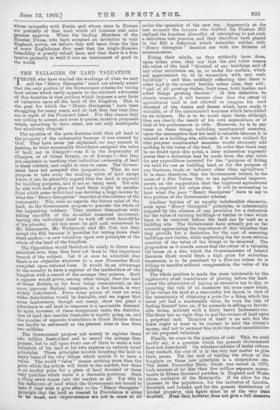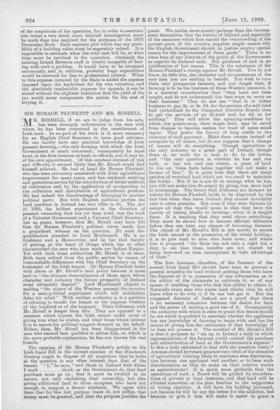THE FALLACIES OP LAND 'PALLIATION.
THOSE who have studied the workings of what we may call the "Henry Georgeite" mind are already aware that the only portion of the Government scheme for taxing land values which really appeals to the stalwart advocates of this taxation is that portion which imposes a new form of valuation upon all the laud of the kingdom. This is the goal for which the "Henry Georgeites " have been struggling for many years, and at last they feel that they are in sight of the Promised Land. For this reason they are willing to accept, and even to praise, taxation proposals which, according to their creed, are not only inadequate but absolutely illogical.
The apostles of the pure doctrine hold that all land is the property of the community because it was created by God. They have never yet explained, we may remark in passing, to what community Providence assigned the value of land, say in Glasgow—was it to the community of Glasgow, or of Great Britain, or of Europe P—but they are emphatic in teaching that individual ownership of land is sheer robbery, and ought at once to cease. The Govern- Ment have not accepted this proposition. They do not propose to take away the existing value of land except where it can be plausibly argued that the land is required for building purposes, and is not so being used. Yet side by side with such a piece of land there might be another from which some individual was deriving a huge income by what the "Henry Georgeites " describe as the robbery of the community. Nor, even as regards the future value of the land, do the Government propose to prevent the whole of the impending robbery. They content themselves with taking one-fifth of the so-called unearned increment, leaving the individual thief to walk off with four-fifths of his plunder. All this must be gall and wormwood to Mr. Hemtnerde, Mr. Wedgwood, and Mr. Ure, but they accept the Bill because it provides for letting down their sheet-anchor,—a. new valuation upon new principles of the whole of the land of the kingdom.
The Opposition would therefore do wisely to direct more attention even than they have yet done to this important branch of the subject. Let it at once be admitted that there is no objection whatever to a new Doomsday Book compiled upon rational lines. It would be an advantage to the country to have a register of the landholders of the kingdom with a record of the acreage they possess. Such a register would prove, among other things, that the land of Great Britain, so far from being concentrated, as the more ignorant Radical imagines, in a few hands, is very widely distributed. From some points of view an even Wider distribution would be desirable, and we regret that some landowners, though not many, show too great a reluctance to sell land in response to a reasonable demand. In spite, however, of these exceptional cases, the distribu- tion of land. into smaller freeholds is rapidly going on, and the number of separate freeholders in Greal. Britain alone can hardly be estimated at the present time at less than two millions.
The Government propose not merely to register these two million freeholders and to record the acreage they possess, but to call upon every one of them to make a new valuation of his land at his own expense on entirely novel principles. These principles involve divesting the land in many cases of the very things which enable it to have a value. The world "value" means nothing more than the price which the article will fetch in the market, but there is no market price for a piece of land divested of those very qualities which make it a desirable purchase. Such a thing never comes into the market at all. Yet this is the definition of land which the Government are bound to take if they wish to give effect to the "Henry Georgeite " pritioipla that the land as created by Providence is alone tO be taxed, and • iMprevettlenti ire not to dente at all under the operation of the new tax. Apparently at the last moment the lawyers who drafted the Finance Bill realised the hopeless absurdity of attempting to put such a definition into practice, and they therefore have placed in the Bill a definition which coincides neither with "Henry Georgeite " theories nor with the dietates coniinon-sense.
Fixing their minds, as they evidently have done, upon urban sites, they say that the site value means the value of the land "divested of any buildings and of any other structures on, in, or under the surface, which are appurtenant to, or in connection with, any such buildings "; and then suddenly reflecting that there is other land in the country besides urban sitea, they add : "and of all growing timber, fruit trees, frnit bushes, and other things growing thereon." If this definition be closely scanned, it will become clear that the owner of agricultural land is not allowed to imagine his land divested of the drains and, fences which have made it valuable, or of the unexhausted manures which have added to its richness. He is to be taxed upon these, although they are clearly the result of his own expenditure or of that of his predecessors in title. Moreover, he is to pay taxes on these things, including unexhausted manures, upon the assumption that his land is valuable because it is wanted as a building site, although if it were utilised for that purpose unexlmusted manures would obviously add. nothing to the value of the land. In order that there may be no doubt upon this point, a later subsection expressly states that a, deduction may be made from the site value for any expenditure incurred for the "purpose of fitting the land for use as building land, or for the purpose of any business, trade, or industry other than agriculture." It is clear, therefore, that the Government intend, in the name of a Site Values Tax, to tax agricultural improve- ments on the supposition that the improved agricultural land is required for urban sites. It will be interesting to hear what the pure "Henry Georgeites " have to say to this portion of the Government scheme.
Another burden of an equally indefensible character, even upon "Henry Georgeite " principles, is inferentially imposed by the absence of any provision for a deduction for the value of existing buildings or timber or trees which have to be removed before the laud can be used as a building site. The Government have actually got so far towards appreciating the importance of this injustice that they provide for a, deduction for the cost of removing buildings and timber, while neglecting the far more Serious question of the value of the things to be removed. The proposition as it stands means that the owner of a valuable old house on a bite, which the ComMissioners of Inland Revenue think would fetch a high price for suburban tenements, is to be penalised by a Site-tax unless he is willing to sacrifice without compensation the value of his The whole position is made the more intolerable by the ingeniously cruel contrivance of placing before the land- owner the alternative of paying an excessive tax to-day, or incurring the risk of an excessive tax some years hence. If he values his laud at a reasonably low figure, in view of the uncertainty of obtaining a price for a thing which has never yet had a marketable value, be runs the risk of finding himself later on, if he succeeds in selling on favour- able terms, mulcted with a fairly heavy Increment-tax. The State has no right thus to put the owners of land upon a perpetual rack. Taxation in itself is an evil, but the State ought at least to be content to take the citizen's money, and not to torment him with the cruel uncertainties of the proposed valuation.
Finally, we come to the question of cost. This, we need hardly say, is a question which the present Government have not considered. On whatever scheme of social reform they embark, the cost of it is the very last matter to give them pause. Yet the task of valuing the whole of the kingdom on these new principles is a stupendous one. The latest Doomsday Book, winch was issued in 1878, took account of no less than five million separate assess- meets in fifteen thousand parishes in England and Wales alone, exclusive of the Metropolis. If we allow for the increase in the population, for the inclusion of London, Scotland, and Ireland, and for the greater distribution of landed property, thii figure must be at the very lsitit doubled. Ettiti that, tioitiVer, doer not give a full Melilla. of the magnitude of the operation, for in order to ascertain site values a very much more detailed investigation must be made than was required for the purposes of the 1873 Doomsday Book. Each separate plot which has any possi- bility of a building value must be separately valued. It is impossible to estimate what the total coat will be, or what time must be involved in the operation. Certainly the existing Inland Revenue staff is utterly incapable of deal- ing with such a problem. It would have to be increased enormously, and, in addition, probably huge expenditure would be incurred for fees to professional valuers. When to this expense incurred by the State is added the expense imposed upon the landowner for his own valuation, and the absolutely incalculable expense for appeals, it can be stated without the slightest hesitation that the yield of the tax would never compensate the nation for the cost of levying it.











































 Previous page
Previous page